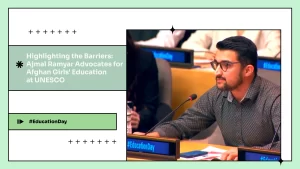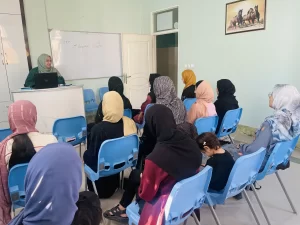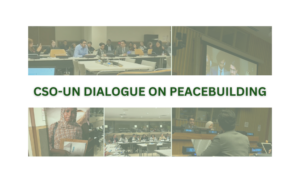On December 12, 2024, Ajmal Ramyar, Executive Director of Afghans for Progressive Thinking (APT), briefed the Peacebuilding Commission (PBC) at the United Nations Headquarters in New York during the 2nd CSO-UN Dialogue on Peacebuilding. Representing the voices of young peacebuilders globally, Ajmal presented the outcomes and recommendations discussed during the dialogue on the theme of Youth, Peace, and Security (YPS).
First, ‘Prevention and Participation’: Young people, in general, and specifically in countries like Palestine, Syria, Ukraine, Lebanon, and Afghanistan, are questioning the quality of prevention work in our current realities, where the world is facing increasing tensions, violent conflict, and inequalities. In almost all fragile states, youth participation often remains symbolic. Mechanisms like National Action Plans (NAPs) tend to become tokenistic, capital-centric goals, leaving most youth behind in terms of participation and leadership. As we approach the 2025 Peacebuilding Architecture Review and the 10th anniversary of YPS next year, it is time to push for meaningful inclusion and accountable actions to address these gaps and demonstrate that we stand for inclusive youth participation in sustaining peace.
Second, Bridging the YPS and WPS Agenda: The YPS and WPS agendas are closely interconnected, and sharing lessons learned, successes, and challenges from WPS can enhance the effectiveness of YPS. Coordination mechanisms are needed at both national and global levels to ensure alignment and effectiveness. Stakeholders targeting both youth and women in their programs can actually close the gap well and create long-term impacts on peace and security. UN covers youth and women as key stakeholders under the Leave No One Behind approach, but there are also risks of tokenistic inclusion and extremely limited focus on youth and young women. Bridging these agendas raises holistic awareness and promotes understanding in broader ways.
Thus, specific recommendations that we can focus on are:
- Support independent youth-led mechanisms to track the level of youth participation in peacebuilding decision making, including in national YPS frameworks development and implementation. Please note we already have relevant collaborative initiative for this called YPS monitor, which requires more support.
- Develop strong accountability mechanisms for member states and other stakeholders around youth participation and prevention work.
- Encourage intergenerational and cross-agenda collaboration, particularly between YPS and WPS to address shared challenges and leverage synergies.
- Invest in civic education to empower more young people to engage in advocacy.
In conclusion, the insights from today’s session underscore the urgent need to translate the YPS agenda into inclusive and tangible action.





